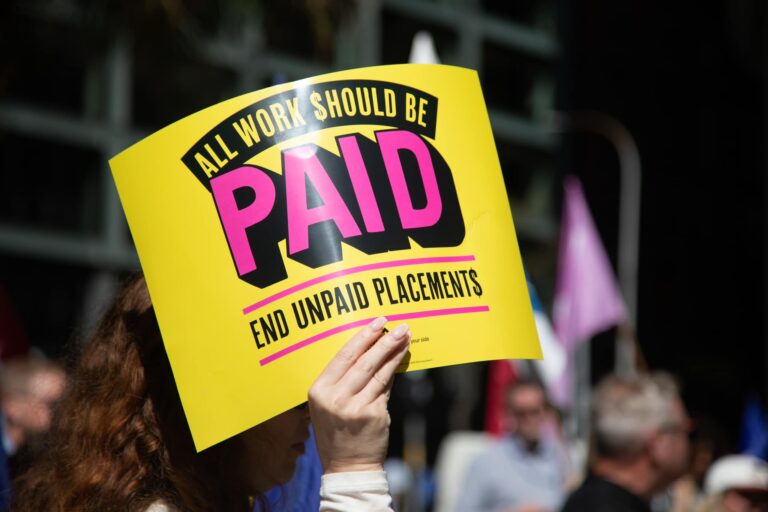
Whores’ day makes workers see red
About 60 sex workers plus supporters gathered outside Parliament House on Tuesday, International Whore’s Day, to protest discrimination against their trade.
A key gripe was newspapers which charge differential advertising rates for sex businesses.
“The newspapers that do take ads always charge sex workers more than anyone else,” said Elena Jeffreys, President of the Scarlet Alliance which organised the event.
She singled out The Daily Telegraph: “They charge us ten times as much as any other advertiser. If we were covered by anti-discrimination laws they wouldn’t be able to.”
“There’s an assumption that sex workers make heaps of money but that’s not necessarily so. It’s like extortion,” she said.
Later she asked if there were any Telegraph reporters in the media scrum. No-one replied.
Ms Jeffreys said she and her colleagues faced discrimination in many other fields: banks would not extend loans, workers could not include their profession on CVs when applying for jobs and some Councils bent over backwards to suppress sex workers.
“It’s ridiculous – there isn’t a council area in Sydney whose residents don’t use our services. Yet we pay rates and we pay taxes, so we deserve the same rights as everyone else.”
Entertainer and sex worker Norrie mAy Welby said society projected its hang-ups onto sex workers.
“A lot of matrons get their noses out of joint because they are scared their husbands might be going to a prostitute – and a lot of them do – so they complain to councils and try to get brothels closed.
Ms Welby said many of her colleagues were reluctant to come out in public and be political because of the stigma they faced from society, and many workers kept their profession secret from family and friends.
A banner at the rally, appropriately red, said “No bad whores, just bad laws”.
This was part of a Scarlet Alliance policy of reclaiming the term ‘whore’ as a positive word since it is often used in a negative way.
International Whores Day started in Lyon, France in 1975 in response to discrimination against sex workers by local police. They carried red umbrellas and occupied a church and refused to leave. Police threatened to confiscate their children unless they vacated the premises, until a number of other local women joined them in solidarity. Unable to tell the whores from the regular citizens, the police had to capitulate.
The Lyons group carried red umbrellas which have become a symbol of sex workers’ rights internationally.
by Michael Gormly










